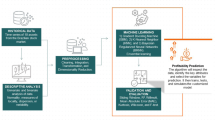Abstract
Several researchers have demonstrated that real estate investments have improved the risk-adjusted performance of mixed-asset portfolios belonging to institutional investors. In order for these portfolio strategies to be more effective, one could use price predictions (instead of historical data) to optimize weights. The goal of this paper is to investigate the predictive performance on price time series of REITs (real estate investment trusts), stocks and bonds, of five different machine learning (ML) algorithms. These algorithms are: linear regression; support vector regression; gradient boosting; long short-term memory neural networks; and k-nearest neighbour. We run experiments on 90 datasets and compare the ML results to those of an ARIMA model, which is a popular econometric benchmark used in financial time series predictions. Our results show that machine learning algorithms statistically outperform ARIMA. In addition, we find that all machine learning algorithms are able to produce very low root mean square errors, with linear regression and long short-term memory obtaining the lowest error values.
Access this chapter
Tax calculation will be finalised at checkout
Purchases are for personal use only
Similar content being viewed by others
References
Akinsomi, O.: How resilient are reits to a pandemic? The COVID-19 effect. J. Prop. Invest. Financ. (2020)
Andrew, M., Glenn, M.: Public and private real estate in a mixed-asset portfolio. J. Real Estate Portf. Manag. 9(3), 193–203 (2003)
Brabazon, A., Kampouridis, M., O’Neill, M.: Applications of genetic programming to finance and economics: past, present, future. Genet. Program Evolvable Mach. 21(1), 33–53 (2020)
Brookhouse, J., Otero, F.E., Kampouridis, M.: Working with OpenCL to speed up a genetic programming financial forecasting algorithm: initial results, pp. 1117–1124 (2014)
Chen, W., Zhang, H., Mehlawat, M.K., Jia, L.: Mean-variance portfolio optimization using machine learning-based stock price prediction. Appl. Soft Comput. 100, 106943 (2021)
Fisher, J.D., Sirmans, C.: The role of commercial real estate in a multi-asset portfolio. J. Prop. Manag. 59(1), 54–9 (1994)
Freitas, F.D., De Souza, A.F., De Almeida, A.R.: Prediction-based portfolio optimization model using neural networks. Neurocomputing 72(10–12), 2155–2170 (2009)
Geiger, P., Cajias, M., Fuerst, F.: A class of its own: the role of sustainable real estate in a multi-asset portfolio. J. Sustain. Real Estate 8(1), 190–218 (2016)
Habbab, F., Kampouridis, M., Voudouris, A.: Optimizing mixed-asset portfolios involving reits (2022)
Jain, P.: J-REIT market quality: impact of high frequency trading and the financial crisis (2017). SSRN 2972092
Jain, S., Mandal, P., Singh, B., Kulkarni, P.V., Sayed, M.: Prediction of stock indices, gold index, and real estate index using deep neural networks. In: Gunjan, V.K., Suganthan, P.N., Haase, J., Kumar, A. (eds.) Cybernetics, Cognition and Machine Learning Applications. AIS, pp. 333–339. Springer, Singapore (2021). https://doi.org/10.1007/978-981-33-6691-6_37
Jayaraman, B.: Building Wealth Through REITS. Marshall Cavendish International Asia Pte Ltd., Singapore (2021)
Lekander, J.R.: Real estate portfolio construction for a multi-asset portfolio. J. Prop. Invest. Financ. (2015)
Li, R.Y.M., Fong, S., Chong, K.W.S.: Forecasting the reits and stock indices: group method of data handling neural network approach. Pac. Rim Prop. Res. J. 23(2), 123–160 (2017)
Lian, Y.M., Li, C.H., Wei, Y.H.: Machine learning and time series models for VNQ market predictions. J. Appl. Financ. Bank. 11(5), 29–44 (2021)
Loo, W.K.: Predictability of HK-REITS returns using artificial neural network. J. Prop. Invest. Financ. (2019)
Ma, Y., Han, R., Wang, W.: Prediction-based portfolio optimization models using deep neural networks. IEEE Access 8, 115393–115405 (2020)
Mishra, S.K., Panda, G., Majhi, B., Majhi, R.: Improved portfolio optimization combining multiobjective evolutionary computing algorithm and prediction strategy. In: World Congress on Engineering, vol. 1 (2012)
Stephen, L.: The return due to diversification of real estate to the us mixed-asset portfolio. J. Real Estate Portf. Manag. 11(1), 19–28 (2005)
Vrieze, S.I.: Model selection and psychological theory: a discussion of the differences between the Akaike information criterion (AIC) and the Bayesian information criterion (BIC). Psychol. Methods 17(2), 228 (2012)
Webb, J.R., Curcio, R.J., Rubens, J.H.: Diversification gains from including real estate in mixed-asset portfolios. Decis. Sci. 19(2), 434–452 (1988)
Wiklund, E., Flood, J.H., Lunde, J.: Why include real estate and especially reits in multi-asset portfolios? (2020)
Yamaoka, K., Nakagawa, T., Uno, T.: Application of Akaike’s information criterion (AIC) in the evaluation of linear pharmacokinetic equations. J. Pharmacokinet. Biopharm. 6(2), 165–175 (1978)
Author information
Authors and Affiliations
Corresponding author
Editor information
Editors and Affiliations
Rights and permissions
Copyright information
© 2024 The Author(s), under exclusive license to Springer Nature Switzerland AG
About this paper
Cite this paper
Habbab, F.Z., Kampouridis, M. (2024). Machine Learning for Real Estate Time Series Prediction. In: Panoutsos, G., Mahfouf, M., Mihaylova, L.S. (eds) Advances in Computational Intelligence Systems. UKCI 2022. Advances in Intelligent Systems and Computing, vol 1454. Springer, Cham. https://doi.org/10.1007/978-3-031-55568-8_23
Download citation
DOI: https://doi.org/10.1007/978-3-031-55568-8_23
Published:
Publisher Name: Springer, Cham
Print ISBN: 978-3-031-55567-1
Online ISBN: 978-3-031-55568-8
eBook Packages: Intelligent Technologies and RoboticsIntelligent Technologies and Robotics (R0)




